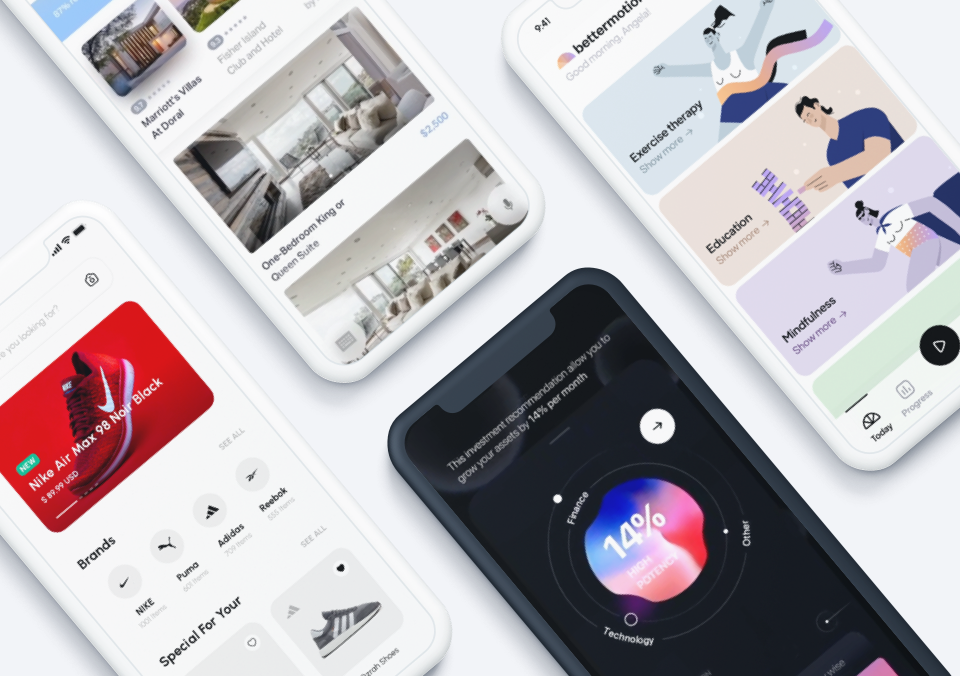Most of us are familiar with the archetype and myth of the “typical” app developer. While the tech industry in general (and certain sectors like engineering and programming) are notoriously homogenous, it’s our belief (and experience) that anyone can — and should — pursue a career as an app developer if they truly want to.
Not quite sure how to start — or even what starting looks like?
To help young (or not young) mobile app developers figure out how to pursue a career in this exciting and dynamic field, we brought three of our best developers (George Stratis, Marios Vladimerou, and Panagiotis Paraskeva) together and asked them a few questions about their careers. And perhaps more to the point: we asked them what advice they’d have for people looking to pursue mobile app development. Here’s what they had to say.
Focusing on Continuing Education
First, we wanted to ask our developers what formal education they’d received — and more importantly, if they felt that it was worth it for them. So often university education is encouraged (and even expected), but it’s not the only path to a career in mobile app development.
“I have a university degree, but it really wasn’t worth it for me,” says Vladimerou. “It might be different for everyone, but I don’t believe it really gave me much of an advantage in the job market.”
Truthfully, while all three of our developers received formal training, that wasn’t where it seemed they learned the most — and that’s not surprising, either. Many developers will echo the fact that a lot of learning how to code is just about, well, coding! Picking up projects yourself, exploring what other people have created, or trying to solve a problem that is meaningful to you are all useful ways of learning how to code. In many ways, they’re faster, too.

We also wanted to know what they currently do to stay on top of trends. Mobile app development (much like any other tech-related field) moves rather quickly and it’s incredibly important to focus on continuing education. Our developers agreed.
“I try to keep up with new trends. I’ll hop in an online course, pick up side-projects, read tech subreddits — whatever I can to keep informed,” says Stratis.
Vladimerou echoed that sentiment. “I keep myself fresh by following Reddit, Twitter, Hacker News, email newsletters, blog posts, Udemy and YouTube videos, browsing open-source projects on Github — whatever I can get my hands on.”
Paraskeva told us that he’d developed an entire system to keep himself fresh: “I am using three techniques to keep up with new trends and technologies.
“The first and most important is to always investigate your field (Android, iOS, webdev, etc.) by watching seminars/conferences videos from YouTube, reading articles on Medium and trying out new code with new libraries or programming patterns (MVP,MVVM,MVI).
“Second, I always talk with my coworkers about new technologies I discovered and try to explain them. This way I can get a second opinion or maybe learn something new from them.
“Finally, every couple of months I’ll look at job ads and see what people are looking for. That helps me see what is most in-demand and exciting — it’s a pretty good guide to see what’s coming down the pipeline.”
What Programming Languages Are Important?
A question that many would-be developers ask is a completely understandable one: what programming language should I learn?
The truth is, there isn’t really one concrete answer. It depends on what field you want to go into and what it is you want to create. Likewise, while it’s rare for a programmer to sometimes know just one language, there are many that specialize in a particular language.
“I’m fluent in three programming languages and knowledgeable in three more. I also know two query languages,” says Stratis. “I don’t think this matters, though. If you understand how compilers work and have theoretical algorithm knowledge, you can learn any language. It used to be that you could not survive in the industry specializing in just one small thing, but now it could be a great advantage to be an expert in a niche area.”
Vladimerou also knows multiple languages. “I can write in around seven languages, but I can’t say that I ‘know’ all of them since it’s been awhile.”

“It’s a good idea to specialize in one language, but it’s also a good idea — if you are working with a high-level language — to also have experience with a low-level programming language such as C.”
Paraskeva echoed both of his colleagues: “I know five programming languages. I believe it is good to specialize in one programming language, that way you can stand out compared to your peers. With that said, you should always keep an open mind and be willing to learn new programming languages.”
What’s Something That’s Benefited You in Your Development Career?
Next, we asked our developers a more abstract question: what’s something in your career that has greatly benefited you? Is there a class you’ve taken, or a tip that helped you land your dream job?
Stratis was first up, with a simple piece of advice: “Patience and serenity in times of crisis. To apply the same analytical skills we learn for breaking down problems to workflow, communications, and business areas.”
True enough, while many see developers as nothing more than code machines, the reality is that a developer often has to double as a project manager, a business liaison, and about a hundred other roles as needed. Being able to switch between them quickly — without getting flustered — is a key to success.
Paraskeva had a lot to say regarding keeping ahead of trends and always looking forward:
“When I finished university, I used to believe that I knew enough to find a job and have a long career in the field of computer science. After a couple of months working as an Android developer, I realized the market is not steady and it is always shifting and changing from one technology to another. You must always study and keep up with the new technologies/trends, but also you must evaluate how that trend will benefit your current career. Never stop learning and evolving your skills.”
What Would You Say to Young People Looking at a Career in Development?
Finally, we asked our three developers what advice they’d have for someone considering a career in mobile app development out of school.
“Good luck! While it isn’t my area of expertise, it seems that product design and marketing are more crucial than complexity and functionality. Also that great apps are made by small teams, not individuals or large teams,” says Stratis.
We have to agree, on both counts! Many new developers make the crucial mistake of thinking that complexity is what users want. Truthfully, most people just want an app that does what it says it will — we don’t want something overly complicated. Likewise, Stratis is right to point out that some of the best apps are made by small teams — not large groups or by individuals.

Often, putting a killer app together is about having a diverse set of opinions to pull from (without being so large that everyone’s voice ends up getting drowned out).
“Mobile applications are in demand right now, but the market started to shift from native applications to cross-platform applications and PWAs. My suggestion is to first study the basics of both Android and iOS native development and then move to cross-platform technology,” says Paraskeva.
“Cross-platform technologies like react-native, Flutter and Xamarin are appealing at first, but currently, they come with many limitations. Furthermore, Google and Apple do not own those technologies (Google owns Flutter), thus all their updates and fixes for their respective platforms will be first and in most cases only for the native applications. Moreover, if you start studying native development, study Kotlin for Android and Swift for iOS.”
In short: keep an eye on what’s currently in demand, but don’t forget about what might be in demand next year — or the year after that.
Tips for Pursuing a Career as a Mobile App Developer
As some of our top mobile app developers have shown, there is no right or wrong way to go about it. The path you take will be unique to your interests, opportunities, and personal circumstances.
If you decide to go the university route or are currently enrolled and wondering what area to focus on, the most common bachelor’s degree programs for mobile app developers are in the following areas:
- Computer Science
- Software Engineering
- Mobile Application Development
- Mobile Computing
If you’ve studied something else and are looking to switch to a new career as a mobile app developer or don’t want to commit to a four-year university degree, there are no shortage of training programs available to help you get started and get a foot in the door in the industry of your choosing.
Many of the best mobile app developers are at least partially self-taught, and there’s no shortage of training materials and tutorials available online to help you get started and supplement your learning, whether you decide to enroll in a university program or attend a bootcamp training.
Getting Your First Job as a Mobile App Developer
There have never been more tools and opportunities to design and build mobile apps, from games to ecommerce tools. According to The Balance Careers:
“Given the popularity of smartphones and tablets, mobile developers are in high demand. These are among the highest paying tech jobs. Due to the ever-changing mobile ecosystem, many app developers are self-taught. It’s also common for developers to have taken courses in computer science, and some even have masters’ degrees or PhDs in the field.”
If you know exactly where you’d like to work in terms of a company or particular industry, you’re already ahead of the game! Mobile apps for business have become as ubiquitous — and essential — as websites, so there is literally no shortage of opportunities for talented and ambitious mobile app developers to get a foot in the door anywhere from a young startup to a traditional corporation.

Generally speaking, industry data suggests that the demand for qualified developers will far outpace other industries in terms of job growth and career opportunities over the next decade.
If you can find a mentor, they can offer invaluable help and support in finding a job and expanding your network as well as helping you to become a better developer. Remember that you don’t have to find your dream job right away when you’re just getting out of the gate. Getting experience and building a strong body of work will help you get where you want to be, so plan big but be open to starting small.
Looking to Get Started Designing Your Own Mobile App?
Do you have an idea for a great mobile app that you’re just itching to get out? Do you find yourself daydreaming about it instead of paying attention to coursework (or actual work)? You don’t need a computer science degree or advanced training or experience to get started! Try our full-featured free trial today to get started and get your idea out of your head and into a mobile app prototype.
Our easy-to-use drag and drop format allows anyone to build the prototype they see in their minds. And thanks to our interactive user testing capabilities, you can work out a bunch of those bugs before you even get to development — a plan that will save you a great deal of both time and money.
We’re confident that our prototyping tool will help you finally bring that brilliant mobile app idea to fruition. To learn more, check out our demos so you can see exactly how people have used Proto.io for their own mobile app ideas.
What advice do you have for budding mobile app developers? Let us know by tweeting us @Protoio!






